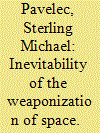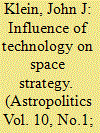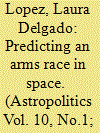|
|
|
Sort Order |
|
|
|
Items / Page
|
|
|
|
|
|
|
| Srl | Item |
| 1 |
ID:
111630


|
|
|
|
|
| Publication |
2012.
|
| Summary/Abstract |
Since the launch of the Sputnik satellite and the start of the modern space age, nations have sought to capitalize on the scientific, political, and economic returns that stem from that frontier. In the United States, national policy guides the development of the space industry as an economic force and is itself guided by recommendations from periodic committees and other bodies. Although these policies have produced clear scientific and political rewards, the economic results are more mixed. In particular, manned orbital spaceflight has long struggled with issues of sustainability. This article uses a macroeconomic approach to identify the subtle but critical differences between manned orbital spaceflight and the rest of the space industry that increase the cost structure of the industry and work against its sustainability. In recognizing these differences, the authors propose a fundamental shift toward the industry model applied to manned orbital spaceflight that incorporates a federal capability addressing on-orbit emergencies. Not only can this capability reduce the difficulties that these differences create, but it fulfills a natural partnering role between government and private industry that is presently missing.
|
|
|
|
|
|
|
|
|
|
|
|
|
|
|
|
| 2 |
ID:
111631


|
|
|
|
|
| Publication |
2012.
|
| Summary/Abstract |
This article argues that a hypothetical decision by the People's Republic of China to assert territorial sovereignty over the area surrounding its planned manned Moon base is plausible. Enhanced international prestige in the near term and access to natural resources and strategic military positions in the long term may be sufficient temptations for China's leaders to challenge the United States to a twenty-first century space race. Strategic surprise could be successfully employed, given the opacity of Chinese decision-making; the conceptual blindness of external observers, including decision-makers, analysts, and academics; and China's repeatedly demonstrated capacity for executing military or diplomatic surprises of comparable magnitude. The ability of signatory states to withdraw from the 1967 Outer Space Treaty with one-year's notice means that international law only poses a temporary obstacle to such a decision. A manned Moon base would fulfill the condition of effective occupation necessary for territorial sovereignty under international law. An international relations constructivist approach discourages consideration of the advantages to states of territorial aggrandizement or the weakness of international law in restraining the behavior of states.
|
|
|
|
|
|
|
|
|
|
|
|
|
|
|
|
| 3 |
ID:
111628


|
|
|
|
|
| Publication |
2012.
|
| Summary/Abstract |
The concept of national security is based on the need to maintain the safety and security of the population. In 1957, the Soviet Union was the first state to threaten this safety in space with the launch of Sputnik. Although Sputnik did not pose a credible threat, it was perceived as such by the Western world. As the space race intensified in the 1960s, efforts were made to prevent the development and use of space weapons. With the 1967 Outer Space Treaty, space weapons were effectively made unlawful, with signatories agreeing to forgo these expensive technologies. However, at the beginning of the twenty-first century, factors and efforts are beginning to converge that indicate the inevitability of space weaponization. Based on a new concept of technological development, this article proposes that as technology advances, space weaponization not only is likely, but indeed is inevitable in the near future. Grounded in the competing theories of technological determinism and social constructivism, I offer a new theory that incorporates both and introduces new components to analyze a near-future technological timeline for space weapons. I argue that the development of these weapons is inevitable and should therefore be accelerated in the United States, given the country's position as the lone superpower, to command and control the space commons. If the United States leads this drive for development, then in the end, as with thermonuclear weapons, space weapons will make the world more, not less, secure, and will contribute to the spread of democratic peace and globalized capitalism.
|
|
|
|
|
|
|
|
|
|
|
|
|
|
|
|
| 4 |
ID:
111626


|
|
|
|
|
| Publication |
2012.
|
| Summary/Abstract |
The influence of technology on the conduct of warfare and the development of strategy is still largely misunderstood. This confusion also holds true regarding technology's influence on space warfare and the development of space strategy. Judging from history, we can expect that advances in space-related technology will be used in ways commensurate with the current paradigm, especially with respect to military operations. Therefore, space operations will probably play supporting roles to operations on land, at sea, and in the air, at least in the near term. It will likely be some time until the strategic advantages of space-based or space-enabled operations are fully appreciated and effectively employed. Additionally, the historical theory and principles of general warfare remain valid, even when considering military operations in space. While advances in space-related technology or space-based weaponry will not change the fundamental nature of warfare, they are expected to change warfare's conduct and character. Through a better understanding of technology's influence on military operations, it is possible to develop a more complete theory and more fully developed strategic principles of space warfare.
|
|
|
|
|
|
|
|
|
|
|
|
|
|
|
|
| 5 |
ID:
111625


|
|
|
| 6 |
ID:
111629


|
|
|
|
|
| Publication |
2012.
|
| Summary/Abstract |
The decision by the Obama Administration of the United States to include the consideration of space arms control measures is one of the latest wake-up calls for stakeholders in the space weaponization debate. Featuring the interplay between economic, political, and technical considerations, the outcome of this issue may depend on the political justifications and implications of the arguments proposed. This article uses international relations theory to analyze the assumptions behind the argument that the United States' placement of weapons in space would inevitably lead to an arms race in space. By examining the structural realist concept of stability and considering what such an arms race in space would entail, it concludes that this outcome is, at best, only probable, and that its continued use weakens the overall argument of anti-space weapons proponents. Addressing such problematic assumptions may prove important not only in strengthening the arguments of stakeholders on both sides of the issue, but also in enriching the debate and bridging perspectives on this highly polarized issue.
|
|
|
|
|
|
|
|
|
|
|
|
|
|
|
|
| 7 |
ID:
111627


|
|
|
|
|
| Publication |
2012.
|
| Summary/Abstract |
Not only astronauts, but also many space-related scientists have made remarkable contributions to the development of a more philosophical view of society. These contributions are illustrated by numerous works produced by famous space pioneers at the end of their careers. The link between science and philosophy is well acknowledged, but the two disciplines suffered a schism some 350 years ago. Now one could ask the question of whether the time has not come to merge both disciplines again. This precise theme can be found in many works and papers written by space scientists. In attempting to create a better understanding of the relation between space and philosophy, it is worthwhile to consider some characteristics of the space workforce. Comparisons have been made between this workforce and so-called "corporate Ronins"-independent and unconventional thinkers who are attracted by the challenging environment offered by space activities. These individuals' presence in the space workforce could therefore be a viable explanation for the philosophical dimension associated with space activities.
|
|
|
|
|
|
|
|
|
|
|
|
|
|
|
|
|
|
|
|
|